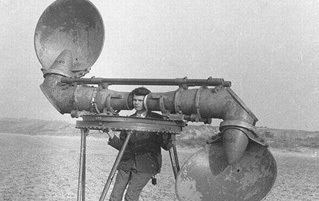5 Hilarious Jobs People Had to Do Before Modern Technology

Before this wondrous age of iPhones, wireless Internet, and teledildonics, the jobs that are now accomplished by sexy, tireless machines were once filled by soft and meaty human beings. Sure, some obscure part of your brain might remember that distant and fantastical time when humans once sewed garments and assembled cars, but you probably had no idea about ...
Human Radar
During World War I, before radar technology was invented, nations had a hell of a problem on their hands. Because planes had been invented, bombing raids could blast your city into a crater on any given morning before you even got to your coffee. The inconsiderate bastards. Detecting incoming aircraft before they started dropping bombs was obviously extremely important. The solution they came up with was this:

A fashion war crime, according to the Treaty of Versailles.
Trained personnel were equipped with these goofy-looking robo-Dumbo ears to literally listen for the engines of incoming aircraft. The idea was that sound from the aircraft would bounce off the comically oversized "sound mirrors" and amplify enough that it could be picked up by human ears. Apparently it worked, because nations all over the world used variations on the same concept. The above image was a Dutch design, while in Germany they were using these steampunk Mouseketeer hats:

"M-I-C-K-E-Y L-A-W-S-U-I-T!"
And the British, apparently the only nation that even tried not to look ridiculous, came up with these:

Useful as well for hearing people laugh at you from far away.
This "acoustic radar" technology did have its limitations -- it worked only on slow-moving aircraft, and there was often difficulty distinguishing between planes and boats -- but it was better than nothing. The concept naturally went out of vogue when radar was invented and military personnel decided that they wanted their dignity back. But just because it's funny, here's a Czech fellow suited up in his country's design of choice:

"Step right, up! Hit one dish and watch the man twirl!"
Log Drivers
Back in the early to mid-1800s, lumberjacking was an even more ridiculously manly job than it is today, owing to the fact that there weren't any trucks or trains to cart all those tree trunks away from the forest to the sawmill. It's true that they had horses and oxen, but how long do you think the poor beasts would last if you had them pulling multi-ton logs across the county nonstop? That's just inhumane. Better to give that job to humans. (Hey, "human" is like 83 percent of the word "humane"!) Lumberjacks frequently employed the services of log drivers, or "river pigs," as they were affectionately known.

Call one a river pig and he'd playfully hit you with his stick.
See, even the heaviest logs can be floated along a river, and that was by far the easiest way to get them from A to B. But seeing as wood has a lousy sense of direction, it tends to run aground when left to its own devices. The log driver's job was to literally ride the logs along the river like an even more poverty stricken Huckleberry Finn.
Some rode ahead to clear a path, some had to stay back and find lost logs that had drifted away from the herd, and others were tasked with clearing up jams. The one thing they all had in common: balancing on some wood with a big pole and looking really awkward in the middle of a river.

And when the log started spinnin', it was time to start swimmin'.
That actually sounds pretty fun. People do that for recreation today, but with an inner tube instead of a log. But no, being a "river pig" was not a cakewalk: Working from dawn to dusk, the log drivers fought off pneumonia and broken limbs to herd logs like cattle along miles of river. Because logs don't usually make for the most seaworthy vessels, the workers faced the ever-present threat of falling into the water and having an impenetrable log tomb seal over their heads. Because it was so dangerous, log drivers were generally paid up to $2 a day, which was almost twice the wages of normal lumberjacks. It's odd, then, that we remember the old-timey lumberjack and not his aquatic cousin. But we suppose "I'm a river pig and I'm OK" just isn't as catchy.
Professional Newspaper Readers

Before automation, cigars, like most products, were made one way: individually, by hand, in a South American sweatshop. Some are still made that way, of course, but now you pay a premium for that kind of artisanal exploitation. Back in the early 20th century, cigar factory workers could entertain themselves only through the power of conversation. The problem is that there is a finite amount of conversation topics in existence before one inevitably has to fall back on the dreaded "Sports, huh?" Needless to say, the job got boring very quickly.

Lung disease was a blessing because at least it livened things up.
In an attempt to keep the workers from truly understanding what Sartre meant by "hell is other people," the profession of "lector" came into being. Originating in Cuba, the job of the lector was to read aloud ... and that was it. Before the invention of television and radio, lectors would take a seat at the front of the factory and, with a loud and clear voice, read the daily newspaper, or a novel, or some erotic Edith Roosevelt fan fiction, to the factory workers.
Soon lectors branched out and began popping up all over U.S. cigar factories. While you might assume that such an incredibly easy job would earn below whatever passed for minimum wage in the early 20th century, the factory itself didn't pay them at all. The workers, desperate for the entertainment that only their beloved lector could provide, chipped in for his salary out of their own wages. With so many workers passing the hat, lectors wound up earning up to a luxurious $75 a week (compared to $20 a week for a factory worker).

$90 if they could do different voices.
After inflation, lectors today would be earning six figures a year to read the New York Times, if not for the fact that commercial radio soon made the job obsolete. They say that video killed the radio star, but they never stop to think about the corpses hidden in radio's basement.
Human Alarm Clocks
We have a hard enough time getting out of bed (that's the affectionate term we use for the bathtub we sleep in -- it ain't comfy, but you take what you can get on 'Internet comedian' salary), and we have functional, affordable alarm clocks. How the hell did they manage it before we mastered tiny machines that scream us awake?

Because as we all know, alarm clocks are totally a recent invention.
With people, of course: The task of an alarm clock was once accomplished by the neighborhood knocker-up.
Don't let the title fool you; this wasn't the guy they hired to impregnate all the town's women (that was the milkman's job). A knocker-up was the person who walked around town in the frigid early hours of the morning with a 12-foot stick and knocked on the townspeople's doors and windows to rouse them from their slumber.

Windows shattered, but that's the price you pay for an early start.
As easy as the job may sound (if they were anything like us, they'd be right back in the tub by noon), imagine waking up before everyone else and braving the frost and vampire attacks just so that you can be the most hated person in town.
Your alarm clock is the receiver of more abuse and vitriol than Nickelback's publicist -- imagine if it had emotions. The knocker-up probably took a thrown shoe to the face every other house.

Call one a pain in the ass and he'd playfully blind you with his stick.
It does raise an interesting question, though: Who exactly woke the knocker-up up in the morning? Whooooaaaaa-
Oh wait, roosters. Right. Carry on.
Dog Whippers
From the 16th all the way to the 19th century, it was more common to let your pet dog run carefree throughout the neighborhood than coop him up in your yard. And just like us, apparently a dog's favorite pastime was to bolt off to the nearest church to harass parishioners, steal the communion bread, hump the priest's leg, and generally make a nuisance of itself.

And yet they all go to heaven.
For this reason, churches employed what was known as a dog whipper, which ... well, it was exactly what it sounds like. Whenever a church service was interrupted by one of Satan's best friends, the dog whipper's task was to evacuate it from the premises as efficiently as possible. Via whipping.

Each church had whips handy in any case. Don't ask.
Dog whippers were first mentioned in church records back in 1622, and they were traditionally armed with two weapons of choice -- the titular dog whip, and a pair of dog tongs that enabled them to handle the mongrels without getting close enough to be bitten. They really missed the boat on that name, though: "Dongs" was right there, guys.
Alexander Pan is a dreamer, a wannabe writer, soon to be an engineer, and (ironically) looking for a job, no matter how weird or crazy. If you've got nothing better to do, you might as well shoot him an email and he'll respond if he feels like it.
Related Reading: These jobs are ridiculous, but this list of jobs Hollywood doesn't realize it needs makes perfect sense. We've also collected a list of super common jobs that are also super freaking dangerous. But hey, there are some lessons you ONLY learn from having a shitty job. And here they are.




